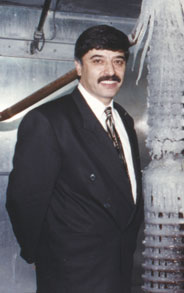|
|
|
|
|
| Web
Features |
|
Find
a Canadian Expert |
|
Events |
|
|
Other
Science News Links |
|
The Professor Who Goes Out in the Cold
Icing of power lines and other components of power grids is an unavoidable
problem in the Canadian winter. Studying and understanding the effects
of such icing is the central goal of the research being done by Université
du Québec à Chicoutimi professor Masoud Farzaneh, holder
of the NSERC/Hydro-Québec Industrial Research Chair on Atmospheric
Icing of Power Grid Equipment (commonly known by its French acronym,
CIGELE).
 Dr.
Farzaneh's Chair, which has just been renewed for a second 5-year term,
offers an exemplary model of co-operation between academia and
industry. The major successes of CIGELE have made it a lot easier to
recruit highly qualified researchers and graduate students. To date,
some 40 people, including 16 master’s and doctoral students
and five postdoctoral fellows, have participated in CIGELE’s
research. CIGELE also partners and collaborates with some twenty industrial
and
academic organizations throughout the world. Dr.
Farzaneh's Chair, which has just been renewed for a second 5-year term,
offers an exemplary model of co-operation between academia and
industry. The major successes of CIGELE have made it a lot easier to
recruit highly qualified researchers and graduate students. To date,
some 40 people, including 16 master’s and doctoral students
and five postdoctoral fellows, have participated in CIGELE’s
research. CIGELE also partners and collaborates with some twenty industrial
and
academic organizations throughout the world.
Dr. Farzaneh, who also holds a Canada Research Chair, believes that
holding an NSERC Industrial Research Chair confers many advantages. “You
can focus your research more directly on practical applications. In
our chair’s case, we are doing research that is innovative, pioneering
and complex.” One of the challenges for Dr. Farzaneh is to balance
his substantial administrative responsibilities as chairholder with
the requirements of his research, which demands a great deal of time
and constant attention.
“The Industrial Research Chairs,” says Dr. Farzaneh, “make
it possible to plan longer-term research projects. They also provide
the opportunity to train more highly qualified people.”
Dr. Farzaneh is very pleased to have partners such as Hydro-Québec
working side-by-side with him. Along with other partners, Hydro-Québec
places human and physical resources at CIGELE’s disposal, thus
enabling it to achieve its research objectives much more quickly and
easily.
In 2000, working closely with Hydro-Québec, CIGELE established
a world-class laboratory on power grid equipment icing. The new laboratory
building houses the most technologically advanced equipment for simulating
icing of high-voltage equipment. As Dr. Farzaneh proudly relates, “This
laboratory is the only one of its kind. Together with the critical
mass and expertise that we have developed within CIGELE, it enables
us to conduct research projects on a major scale.”
CIGELE enjoys an international reputation, and its experts are asked
for their advice and opinions when problems arise as the result of
ice storms. One of the most notable of the many successes achieved
by Dr. Farzaneh and his team is a model for predicting arc shorting
on ice-covered insulators. It was recognized by Québec Science as one of the ten most important scientific discoveries made in Quebec
in 1999.
|